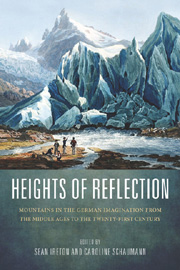 Heights of Reflection
Heights of Reflection from Part III - Modern Expeditions and Evocations: Climbing from the Twentieth into the Twenty-First Century
Published online by Cambridge University Press: 05 February 2013
All hell didn't break loose, it was like a rising psalm materializing like snow on an unseen mountain. All that was underfoot was good, but lost.
— John Ashbery, Where Shall I Wander (2005)Can extreme mountaineering provide helpful allegories for the risks of vertiginous reading? Can a literary work of art, and in turn its reader, temporarily be understood to undergo tectonic shifts that continuously uplift, submerge, and reassert ultimately unmappable epistemic terrain? Avoiding coarsely grained philological quicksand and leaving behind fixations on omniscient methods at hermeneutic base camps, expeditions in reading fiction can still face the challenge of telling apart the climber from the gorge, and untraceable narrators from posthuman landscapes. Could the solitary or synergistic process of reading connote a free-climbing experience, comprising tentative conceptual ascents that navigate across or around petrified dichotomies of conquest and selflessness, of conceptual control and self-abandon? The novel under discussion in this chapter at once thematizes these epistemic conflicts and offers itself as a territory that invites intersecting inscriptions of reading routes.
Rather than signifying sublime permanence in contrast to the vulnerable human body, the mythical Phur-Ri, a fictional, roughly 7,000 meter high Tibetan mountain that is the target of two Irish brothers' expedition in Christoph Ransmayr's Der fliegende Berg (The flying mountain, 2006) emerges as a transient phenomenon. Phur-Ri temporarily disappears and is believed by natives to occasionally fly upward until it descends and becomes visible again.
To save this book to your Kindle, first ensure [email protected] is added to your Approved Personal Document E-mail List under your Personal Document Settings on the Manage Your Content and Devices page of your Amazon account. Then enter the ‘name’ part of your Kindle email address below. Find out more about saving to your Kindle.
Note you can select to save to either the @free.kindle.com or @kindle.com variations. ‘@free.kindle.com’ emails are free but can only be saved to your device when it is connected to wi-fi. ‘@kindle.com’ emails can be delivered even when you are not connected to wi-fi, but note that service fees apply.
Find out more about the Kindle Personal Document Service.
To save content items to your account, please confirm that you agree to abide by our usage policies. If this is the first time you use this feature, you will be asked to authorise Cambridge Core to connect with your account. Find out more about saving content to Dropbox.
To save content items to your account, please confirm that you agree to abide by our usage policies. If this is the first time you use this feature, you will be asked to authorise Cambridge Core to connect with your account. Find out more about saving content to Google Drive.